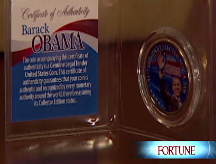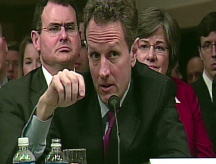Stimulus gap on Capitol Hill
Chronic ill will between Democrats and Republicans is aggravating differences over the trillion-dollar plan.

WASHINGTON (Fortune) -- The presidential motorcade dropped the nation's new leader off on Capitol Hill on Tuesday for a peace mission, with President Obama extending an olive branch to Republicans in the hope of getting his stimulus package through.
First he visited some of the House's 177 Republicans, most of whom view the Democrats' economic-recovery package as full of expensive and counter-productive government spending.
A little more than an hour later, the president decisively marched to the other side of the Capitol to deliver his message of constructive engagement to Republicans in the Senate.
And that night Obama chief of staff Rahm Emanuel hosted several of his former House colleagues -- all moderate Republicans -- for dinner.
It all looked pretty chummy. It really wasn't.
"We're not off to a good bipartisan start," a leading House Republican told a small group of us after leaving the meeting with President Obama.
And just to underscore the divide, House Republicans on Wednesday are proposing their own competing, $500 billion stimulus plan -- one that offers tax breaks for small businesses and bans any future tax increases to pay for added government spending.
The source of the friction here is not President Obama, who was widely lauded by Republican lawmakers Tuesday for asking for their input and offering the hope that "we can all put politics aside."
The problem is the chronic ill will between House Republicans, who want business-oriented tax breaks to spur the economy, and the Democratic leadership, which has crafted a heavy-on-spending bill without GOP input. (The Congressional Budget Office now estimates the debt servicing cost alone to be $347 billion, bringing the total tab on the House bill to more than $1.1 trillion.)
Rather than direct his own, more centrist, economic team to fill in the details of an economic stimulus plan, Obama left it to Congress. In the House, that meant a mostly liberal Democratic leadership has set the terms.
The result is a package loaded with the kinds of spending that immediately made it a ripe Republican target -- $600 million for digital TV subsidy coupons, $50 million for the arts, $200 million to repair the National Mall.
Already, the White House is backing away from two of those gems, the National Mall project and contraception funding, which House Speaker Nancy Pelosi awkwardly insisted was needed to cut costs. After an uproar, especially from the Catholic community -- Pelosi believes "children are a burden on government," asserted one commentator -- the White House strong-armed House Democrats into dropping the line item.
But there's a limit to how much Obama can steer an initiative that didn't originate in his own shop. The same Republican lawmaker who bemoaned the lack of bipartisanship believes legislation produced by Obama Budget Director Peter Orszag and economic adviser Lawrence Summers would have been "cleaner and better" rather than getting this "candy store."
In the end, Republicans fear that the Democratic spending bill won't work to restore the economy, especially since the CBO has concluded that most of the spending won't happen this year, and that excess spending will lead to higher tax rates and the kind of stagnation that Japan experienced in the 1990s.
They also argue that uncertainty over tax rates is compounding economic fears by businesses and lenders.
The House Republican plan expands unemployment insurance, reduces the lowest individual tax rates, allows small business to take a tax deduction equal to 20% of their income, and offers home-buyers a $7,500 credit if they can make a 5% down payment.
Other GOP ideas floating around would offer businesses immediate, 100% expensing on plant and equipment and would suspend the capital gains tax on new investments -- both for two years.
None of this stands a chance of passing the Democratic-controlled House, of course.
But, hey, Obama asked what they thought. So they answered. ![]()
-
 The retail giant tops the Fortune 500 for the second year in a row. Who else made the list? More
The retail giant tops the Fortune 500 for the second year in a row. Who else made the list? More -
 This group of companies is all about social networking to connect with their customers. More
This group of companies is all about social networking to connect with their customers. More -
 The fight over the cholesterol medication is keeping a generic version from hitting the market. More
The fight over the cholesterol medication is keeping a generic version from hitting the market. More -
 Bin Laden may be dead, but the terrorist group he led doesn't need his money. More
Bin Laden may be dead, but the terrorist group he led doesn't need his money. More -
 U.S. real estate might be a mess, but in other parts of the world, home prices are jumping. More
U.S. real estate might be a mess, but in other parts of the world, home prices are jumping. More -
 Libya's output is a fraction of global production, but it's crucial to the nation's economy. More
Libya's output is a fraction of global production, but it's crucial to the nation's economy. More -
 Once rates start to rise, things could get ugly fast for our neighbors to the north. More
Once rates start to rise, things could get ugly fast for our neighbors to the north. More









